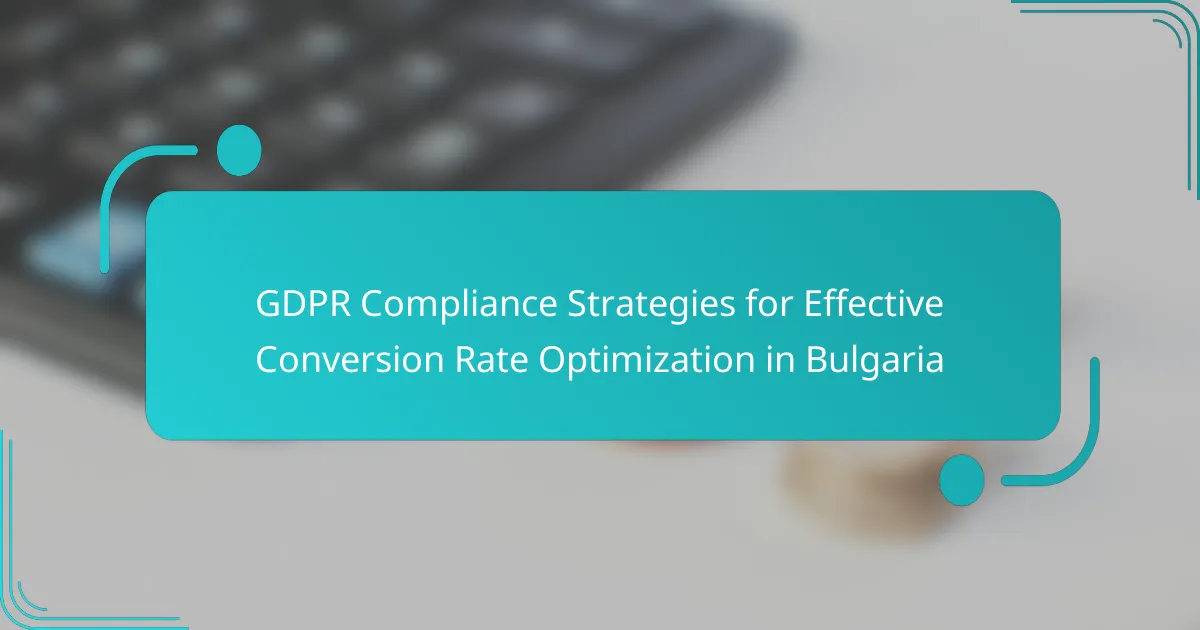In Bulgaria, effective GDPR compliance strategies are essential for optimizing conversion rates while respecting user privacy. By implementing clear consent mechanisms and utilizing specialized tools, businesses can enhance user trust and streamline their marketing efforts, ultimately leading to improved conversion outcomes. Balancing legal requirements with data collection needs is key to achieving success in this digital landscape.
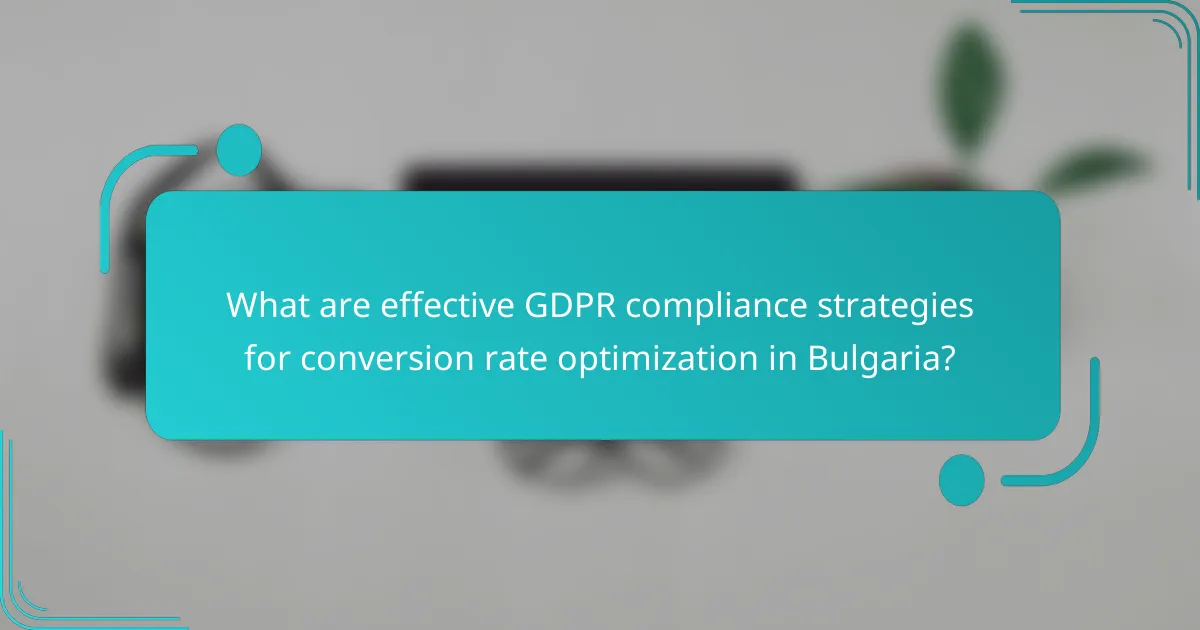
What are effective GDPR compliance strategies for conversion rate optimization in Bulgaria?
Effective GDPR compliance strategies for conversion rate optimization in Bulgaria focus on balancing user privacy with the need for data collection. Implementing these strategies can enhance user trust and ultimately improve conversion rates while adhering to legal requirements.
Data minimization techniques
Data minimization involves collecting only the data that is necessary for a specific purpose. Businesses in Bulgaria should assess their data collection processes and eliminate any unnecessary information requests during user interactions. For example, instead of asking for a full address, consider if just an email or phone number suffices.
Employing techniques such as limiting form fields or using progressive profiling can help gather essential information over time without overwhelming users. This approach not only complies with GDPR but also enhances user experience, leading to higher conversion rates.
Transparent consent mechanisms
Transparent consent mechanisms ensure that users understand what data is being collected and how it will be used. In Bulgaria, businesses should implement clear opt-in options that are easy to understand and accessible. Avoid pre-checked boxes; instead, require users to actively consent to data processing.
Consider using layered consent forms that provide detailed information on data usage while allowing users to make informed choices. This transparency builds trust and can lead to increased engagement and conversions.
Privacy by design principles
Privacy by design entails integrating data protection measures into the development of products and services from the outset. Companies in Bulgaria should adopt this principle by evaluating privacy implications during the design phase of their websites and applications.
Incorporating features such as data encryption, secure access controls, and user-friendly privacy settings can help ensure compliance while enhancing user confidence. This proactive approach can lead to better retention rates and improved conversion outcomes.
User-friendly privacy policies
User-friendly privacy policies are essential for informing users about their rights and how their data will be handled. In Bulgaria, these policies should be written in clear, concise language and easily accessible on websites and apps.
Consider using bullet points or FAQs to highlight key aspects of the policy, such as data usage, retention periods, and user rights. A well-structured privacy policy can enhance user trust and encourage conversions by demonstrating a commitment to transparency.
Regular compliance audits
Regular compliance audits are crucial for ensuring ongoing adherence to GDPR regulations. Businesses in Bulgaria should schedule periodic reviews of their data practices, consent mechanisms, and privacy policies to identify any areas needing improvement.
Establishing a checklist for these audits can help streamline the process, covering aspects like data storage, user consent records, and policy updates. By maintaining compliance, businesses can avoid potential fines and foster a trustworthy relationship with their users, ultimately supporting conversion rate optimization efforts.
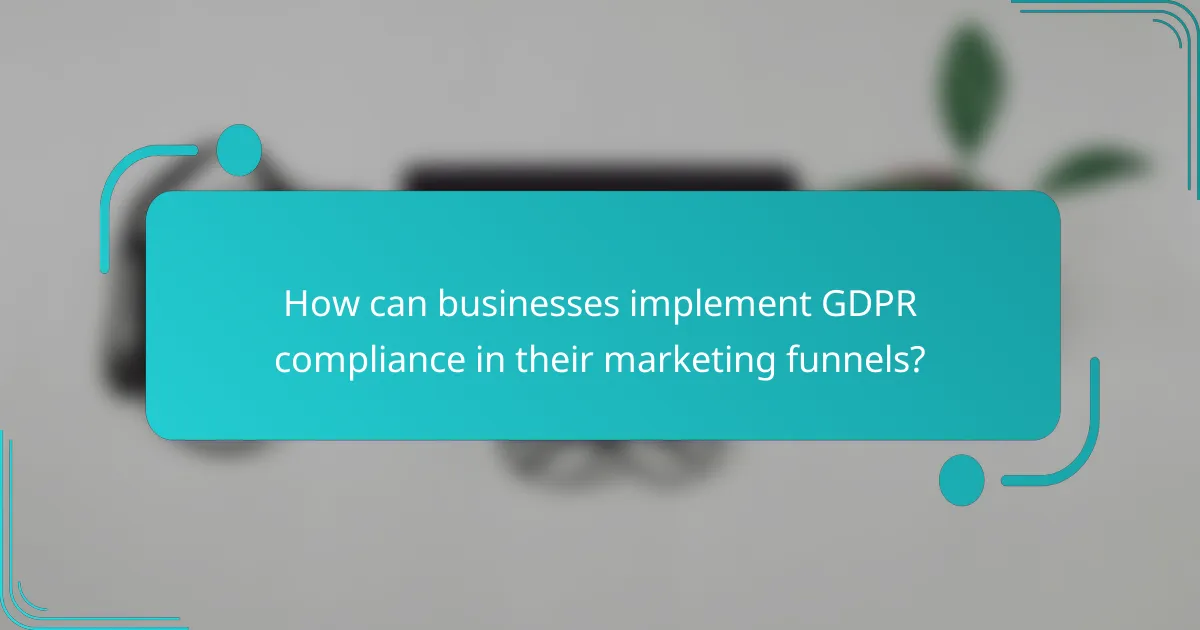
How can businesses implement GDPR compliance in their marketing funnels?
Businesses can implement GDPR compliance in their marketing funnels by ensuring that they obtain explicit consent from users before collecting personal data. This involves integrating clear consent mechanisms throughout the customer journey to build trust and enhance conversion rates.
Integrating consent forms
Integrating consent forms is essential for GDPR compliance. These forms should be prominently displayed at the point of data collection, such as during sign-ups or newsletter subscriptions. Ensure that the language used is straightforward, clearly outlining what data is being collected and how it will be used.
Consider using checkboxes that require users to actively opt-in rather than pre-ticked options. This not only aligns with GDPR requirements but also fosters transparency, which can positively impact user trust and conversion rates.
Using cookie management tools
Cookie management tools help businesses comply with GDPR by allowing users to manage their cookie preferences. These tools provide options for users to accept or reject non-essential cookies, ensuring that only necessary cookies are used without consent.
Implementing a cookie banner that informs users about cookie usage and links to a detailed privacy policy can enhance compliance. Regularly review and update cookie settings to reflect changes in regulations or business practices, ensuring ongoing adherence to GDPR standards.
Implementing opt-in strategies
Implementing effective opt-in strategies is crucial for GDPR compliance. This involves creating engaging content that encourages users to willingly provide their information. Examples include offering exclusive discounts or valuable resources in exchange for email subscriptions.
Utilize double opt-in methods to confirm user consent, which adds an extra layer of verification. This approach not only complies with GDPR but also ensures that your email list consists of genuinely interested users, potentially increasing engagement and conversion rates.
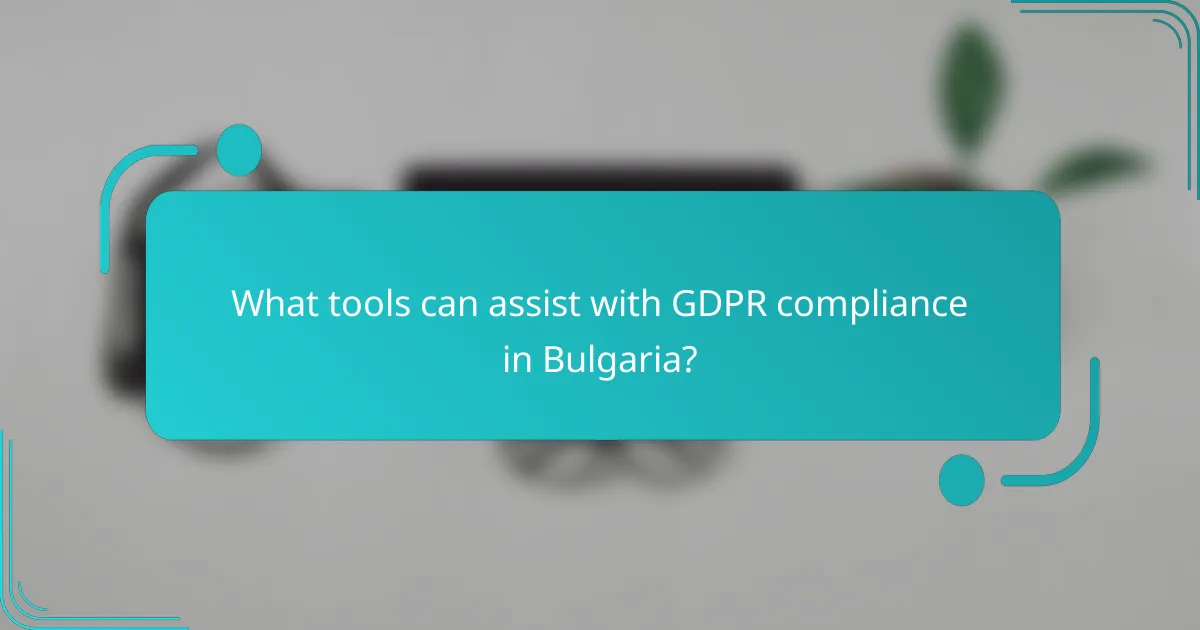
What tools can assist with GDPR compliance in Bulgaria?
Several tools can help businesses in Bulgaria ensure GDPR compliance while optimizing conversion rates. These tools streamline consent management, cookie compliance, and privacy assessments, making it easier to adhere to regulations and maintain customer trust.
OneTrust for consent management
OneTrust is a leading platform for managing user consent in accordance with GDPR. It allows businesses to create customizable consent banners and manage user preferences effectively, ensuring that visitors are informed about data collection practices.
When using OneTrust, consider implementing clear and concise messaging in consent requests. This transparency can enhance user trust and improve conversion rates. Regularly review and update consent settings to reflect any changes in data practices.
Cookiebot for cookie compliance
Cookiebot provides automated solutions for cookie compliance, helping businesses identify and categorize cookies on their websites. This tool generates comprehensive cookie declarations and consent banners, ensuring users are aware of cookie usage.
To maximize effectiveness, configure Cookiebot to scan your site regularly for new cookies. This proactive approach helps maintain compliance and can lead to higher user satisfaction, ultimately supporting conversion goals.
TrustArc for privacy assessments
TrustArc offers tools for conducting privacy assessments and audits, which are essential for GDPR compliance. This platform helps businesses identify potential risks and implement necessary changes to their data handling practices.
Utilize TrustArc’s assessment features to regularly evaluate your privacy policies and practices. Engaging in these assessments can not only ensure compliance but also demonstrate a commitment to data protection, enhancing your brand’s reputation and potentially boosting conversions.
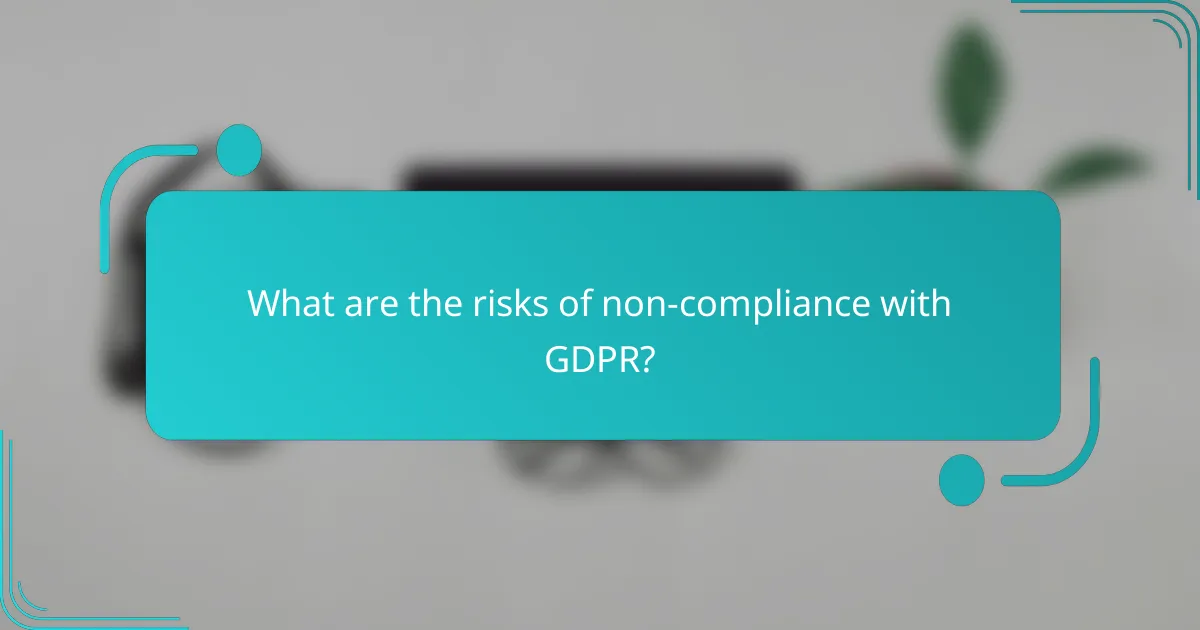
What are the risks of non-compliance with GDPR?
Non-compliance with GDPR can lead to significant financial and reputational damage for businesses operating in Bulgaria. Understanding these risks is crucial for maintaining customer relationships and ensuring legal adherence.
Heavy fines and penalties
Businesses that fail to comply with GDPR can face heavy fines, which can reach up to 4% of their annual global turnover or €20 million, whichever is higher. This financial burden can severely impact small to medium-sized enterprises, making compliance a priority.
To avoid penalties, companies should conduct regular audits of their data processing activities and ensure that they have proper consent mechanisms in place. Implementing a robust data protection strategy can mitigate the risk of incurring fines.
Loss of customer trust
Non-compliance can lead to a significant loss of customer trust, as consumers are increasingly aware of their data rights. If customers feel their personal information is not being handled securely, they may choose to take their business elsewhere.
To maintain trust, businesses should be transparent about how they collect and use customer data. Clear privacy policies and effective communication can help reassure customers that their information is safe and respected.
Legal repercussions
Beyond financial penalties, non-compliance with GDPR can result in legal actions from affected individuals or regulatory bodies. This can lead to costly litigation and further damage a company’s reputation.
To minimize legal risks, companies should ensure they have a designated Data Protection Officer (DPO) and establish clear procedures for handling data breaches. Regular training for employees on GDPR compliance can also help prevent legal issues.
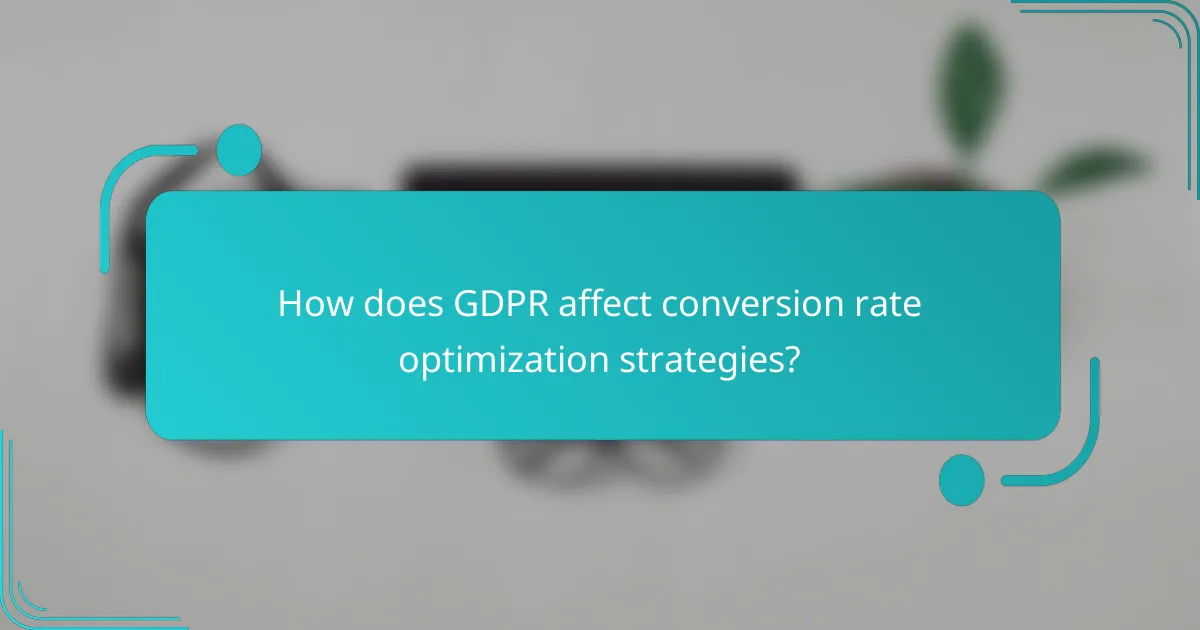
How does GDPR affect conversion rate optimization strategies?
GDPR significantly impacts conversion rate optimization (CRO) strategies by enforcing strict regulations on how businesses collect and process user data. Companies operating in Bulgaria must ensure compliance to build trust and enhance user engagement, which are critical for improving conversion rates.
Impact on user data collection
The GDPR requires businesses to obtain explicit consent from users before collecting their personal data. This means that companies must clearly inform users about what data is being collected, how it will be used, and who it will be shared with. Failure to comply can lead to hefty fines and damage to brand reputation.
To optimize conversion rates while adhering to GDPR, businesses should implement transparent data collection practices. For example, using clear and concise consent forms can help users feel more comfortable sharing their information. Additionally, consider offering value in exchange for data, such as discounts or exclusive content, to encourage users to opt-in.
Regularly reviewing and updating data collection methods is crucial. Businesses should ensure that their practices align with GDPR requirements and adapt to any changes in regulations. This proactive approach not only helps maintain compliance but can also enhance user trust and increase conversion rates over time.
